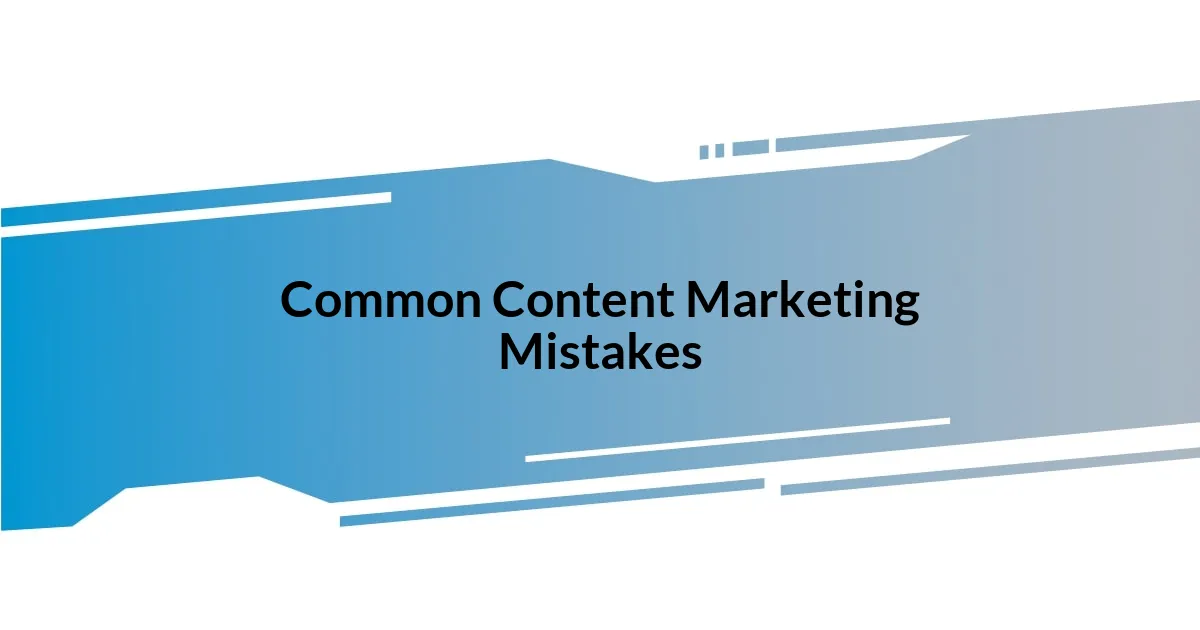Key takeaways:
- Content marketing focuses on creating relevant content to build trust and engage with a targeted audience.
- Measuring effectiveness through analytics is essential for refining strategies and understanding audience preferences.
- Consistency, storytelling, and SEO optimization are vital techniques for successful content marketing.
- Future trends include leveraging AI, personalized content, and embracing video storytelling for enhanced engagement.

Understanding Content Marketing Basics
Content marketing is all about creating valuable and relevant content to attract and engage a targeted audience. I remember when I first ventured into this field; I was overwhelmed by the idea of balancing quality with quantity. It made me wonder: how do successful brands consistently produce content that resonates with their audience?
At its core, content marketing aims to build trust and authority within your niche. One pivotal moment in my journey was when I crafted a blog post that genuinely addressed my audience’s pain points. The feedback I received was eye-opening, reinforcing that understanding your audience’s needs is crucial for creating content that not only captures attention but also fosters a long-lasting relationship.
Moreover, tracking the effectiveness of your content is vital. For instance, I once launched a social media campaign without measuring engagement, and the lack of insight left me guessing. This experience taught me the importance of using analytics tools to gauge what works and what doesn’t, shaping my content strategy moving forward. How can one improve without knowing where they stand? It’s a question worth considering in your own content marketing efforts.

Benefits of Content Marketing
Creating valuable content isn’t just about sharing information; it’s an opportunity to forge connections. One benefit I’ve encountered firsthand is how content marketing can position you as a thought leader in your industry. I remember publishing an informative guide on industry trends that sparked conversations and brought some incredible networking opportunities my way. It truly was a game-changer in establishing my authority and influence.
Additionally, content marketing has a fantastic return on investment compared to other marketing strategies. After shifting my focus towards informative blog posts, I began to see a steady increase in organic traffic to my site. It was empowering to witness how a few well-crafted articles could drive sales and engagement, making me realize the longevity of content and its ability to attract customers over time rather than just through immediate promotions.
Lastly, let’s not forget the emotional impact that consistent content creation can have. I found myself feeling more inspired and motivated each time I shared an article that resonated with my audience. It’s incredible how fostering a community around your content can lead to meaningful interactions and loyalty, making the entire process rewarding on a personal level.
| Benefit | Description |
|---|---|
| Authority Building | Establishes you as a leader in your niche. |
| Cost-Effectiveness | Offers better ROI compared to traditional marketing. |
| Community Engagement | Fosters lasting relationships with your audience. |

Measuring Content Marketing Success
Measuring the success of content marketing is crucial to honing your approach. I often reflect on how data can narrate the story behind the numbers. For example, after a campaign, I once dove into the analytics and was surprised to discover that a seemingly obscure post had gone viral! Understanding which pieces resonate most with your audience not only informs future content but also helps refine your overall strategy.
To effectively measure content marketing success, consider tracking these key metrics:
- Website Traffic: An increase in visits indicates heightened interest in your content.
- Engagement Rates: Likes, shares, and comments reveal how well your audience connects with your posts.
- Conversion Rates: Monitor how many visitors take a desired action, like signing up for a newsletter or making a purchase.
- Bounce Rate: A high bounce rate might signal that your content isn’t meeting audience expectations.
- SEO Performance: Analyze your rankings on search engines to gauge the organic reach of your content.
Each piece of data tells a part of your content’s story. I always find it exhilarating to connect these dots and see the real impact of my efforts in shaping a vibrant online presence. Making sense of these metrics can empower you to cultivate a more effective content strategy that truly resonates.

Techniques for Effective Content Marketing
When it comes to techniques for effective content marketing, consistency is key. I recall a time when I committed to a regular posting schedule—once a week. That simple decision transformed my engagement levels. People began to anticipate my content, and I noticed a growing community excitedly waiting for each new post. Isn’t it fascinating how a routine can build such anticipation?
Another critical technique is to focus on storytelling. I once shared a personal experience about overcoming a challenge in my industry. The response was overwhelming. Readers connected with my vulnerability, sharing their own stories in the comments. This taught me that weaving narratives into your content not only captivates your audience but also invites them to engage on a deeper emotional level.
Lastly, optimizing for SEO ensures that your valuable content reaches the right audience. I remember feeling a rush of excitement when I implemented targeted keywords strategically throughout my blog. Watching my articles climb search rankings was both thrilling and validating. It’s amazing how understanding search engine algorithms can expand your reach. What strategies do you think could work for your unique content?

Common Content Marketing Mistakes
I’ve often found that one of the gravest pitfalls in content marketing is neglecting the target audience. Early in my journey, I created content that I thought was engaging, but it fell flat. I wasn’t truly considering what my audience wanted or needed. It was a wake-up call when I realized that my posts were more about my interests than theirs. Understanding your audience is paramount; without that insight, you’re missing the mark.
Another mistake I frequently observe is infrequent posting. There was a phase where I thought quality over quantity was my mantra, and while that’s important, disappearing for weeks at a time hurt my engagement. I remember the rustle of excitement when I started to post regularly—suddenly, my interactions skyrocketed! People want to see fresh content consistently—without it, even the best pieces can get lost in the shuffle.
Lastly, not optimizing for search engines is a common oversight. I used to shy away from focusing on keywords, thinking that compelling writing alone was sufficient. However, I soon learned that the right keywords could make my work discoverable. After my blog hit a plateau, I revisited my old articles, infused them with targeted keywords, and watched as traffic surged in! I found that balancing creativity with SEO made a huge difference—what about you? Have you ever felt caught between those two worlds?

Strategies for Improvement
I can’t stress enough the importance of regular performance reviews in content marketing. When I began analyzing my content’s effectiveness every month, I uncovered patterns I hadn’t noticed before. For instance, I realized that my audience resonated more with how-to guides rather than opinion pieces. This revelation really shaped my future topics—what patterns have you discovered in your own content assessments?
Another strategy I’ve embraced is repurposing old content. I remember feeling a bit daunted at first, thinking my older pieces were outdated. However, when I revisited a series of popular posts and transformed them into infographics or video content, I was amazed by the renewed engagement they sparked. It made me wonder—how many gems are sitting in your archive just waiting to be dusted off and shared again?
Collaboration has also proven to be a game-changer for me. Teaming up with fellow creators not only brought fresh perspectives but also expanded my audience. I recall collaborating with a video creator for a webinar, and the engagement we received blew my mind! It’s incredible how partnerships can amplify your reach—have you thought about who you could team up with to enhance your own content marketing efforts?

Future Trends in Content Marketing
It’s fascinating to think about how artificial intelligence (AI) is going to shape content marketing in the near future. Just recently, I experimented with an AI tool that generated content ideas based on trending topics and keywords. The speed and efficiency were eye-opening! I wonder how many marketers are already leveraging these tools to stay ahead of the curve. Are we ready to integrate AI in a way that enhances our creativity instead of replacing it?
Another trend I see rising is personalized content. Gone are the days of one-size-fits-all messaging. I recall a campaign where I segmented my audience and tailored emails specifically for each group. The results were nothing short of remarkable; engagement rates soared! When was the last time you considered the power of personalization in your marketing efforts? Experiences like mine show that consumers today crave relevant content that speaks directly to them—why not deliver it?
Lastly, video content continues to dominate and evolve as we head into the future. I used to rely solely on blog posts, but once I started incorporating video snippets, I noticed a distinct shift in engagement. It’s much more dynamic and allows for storytelling that resonates more authentically with viewers. With platforms like TikTok leading the way, I can’t help but wonder: how will you adapt your content strategies to harness the power of video storytelling?